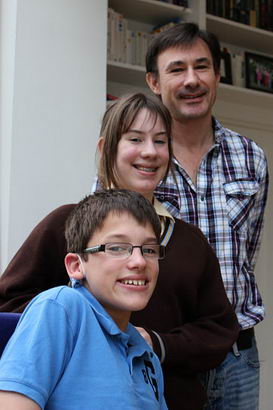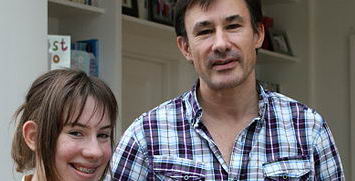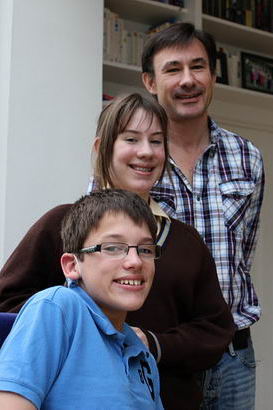
The experiences of fathers whose children have learning disabilities are
shaped by the changing nature of families with disabled children and of the services that provide support.
Foundation for People with Learning Difficulties/Towers, 2009
Read about the issues faced by fathers of children with disabilities.

Recognising Fathers, a national survey of 250 fathers of children with learning disabilities in 2009, found that:
- Nearly half of fathers felt they would like to spend more time with their child but work prevented them from doing so.
- More than 50% of fathers felt they did not receive emotional or practical support from their extended families.
- There are limited opportunities for fathers to have informal contact with practitioners supporting their child.
- Fathers experience a lack of support and poor involvement at the time of diagnosis.
- Fathers emphasised the importance of being recognised and respected by practitioners for what they contribute and
being included in discussions and decision-making.
Source: Gore, 2010

Research has found that, unlike their partners, fathers are often not asked what support they might need. Practitioners frequently tend to focus on the mother, to the exclusion of the father, and inflexible time/work constraints often make it difficult for the father to be present for appointments.
Fathers of children with disabilities may:
- Also take on emotional support of other family members.
- Take longer to come to terms with their child's diagnosis, and have unrealistic expectations about their child's ability.
- Struggle to find work that is flexible enough to incorporate family-life (e.g. time off for appointments etc).
- Often have limited support networks – maybe one friend or parent. Most gained support from their partner, which raises questions for those lone-parent fathers or where a relationship has broken down.
- Be committed with a desire to be involved.

I found it tough at times to balance the expected strength of being male
and the sadness of being the father of a baby who was struggling for life in the NICU.
A father of a pre-term baby cited in Chesney, A. and Champion, P., 2008
One of the special difficulties in being a father on my own is convincing
people that I am capable of looking after a child with special needs. I am facing two lots of difficulties, one showing that
I can look after a child at all, and the second that I can look after a child with special needs.
Bray, 1995
Many fathers feel like the odd one out at the school gate. Fathers are
marginalised from the beginning.
Duncan Fisher (Founder of the Fatherhood Institute), 2009

Despite recent moves to emphasise the role of fathers in years (e.g. Green Paper, DfES 2003), support services for families focus primarily on the role and needs of the mother and are predominantly delivered by women. (Carpenter and Towers, 2008)
Many fathers have said that professional structures and expectations make it difficult to get involved and they often result to taking on or maintaining the traditional emotionally uninvolved bread-winner/protective role. (Carpenter and Towers, 2008)
Indeed researchers have referred to fathers as the 'peripheral parent' (Herbert and Carpenter, 1994), the 'invisible parent' (Ballard, 1994) or they are described as 'hard to reach' (McConkey, 1994). However, it seems that fathers have much more involvement than previous research suggests. This involvement is often missed because it tends to occur in the hours when practitioners do not visit.

Many fathers have little contact with schools. Why is this? Are they shy, or perhaps too busy? Do they feel welcome?
Think of ways in which your setting could be clearer about welcoming all, and flexible in accommodating all those who wish to have some involvement?

Ballard, K. (ed.) (1994) Disability, Family, Whanau and Society, Palmerston North, NZ: Dunmore Press.
Bray, A. et al. (1995) Fathers of children with disabilities: some experiences and reflections, New Zealand
Journal of Disability Studies, 1 (1), 164-176.
Carpenter, B. and Towers, C. (2008) Recognising fathers: the needs of fathers of children with disabilities, Support
for Learning, 23, 118-125.
Chesney, A. and Champion, P. (2008) Understanding the dynamics between preterm infants and their families, Support for
Learning, 23, 144-151.
Champion, P. (2005) The at-risk infant - approaches to intervention: the Champion Centre Model. In: Carpenter, B. and Egerton,
J. (eds) Early Childhood Intervention: International perspectives, national initiatives and regional practice,
Coventry: West Midlands SEN Regional Partnership.

Contact a Family (2008) Fathers: Information for families. London: CAF.
Foundation for People with Learning Disabilities/ Towers, C. and Swift, P. (2006) Recognising Fathers: Understanding the issues faced by fathers of children with a learning disability. London: Mental Health Foundation.
Foundation for People with Learning Disabilities/ Towers, C. (2009) Recognising Fathers: A national survey of fathers who have children with learning disabilities. London: Mental Health Foundation.

Gore, N. (2010) 'Support for fathers of learning disabled children', Community Care.
Herbert, E. and Carpenter, B. (1994) Fathers - the secondary partners: professional perceptions and a father's reflections,
Children and Society, 8 (1), 31-41.